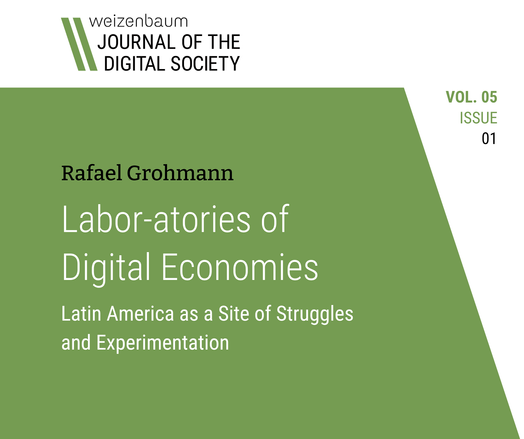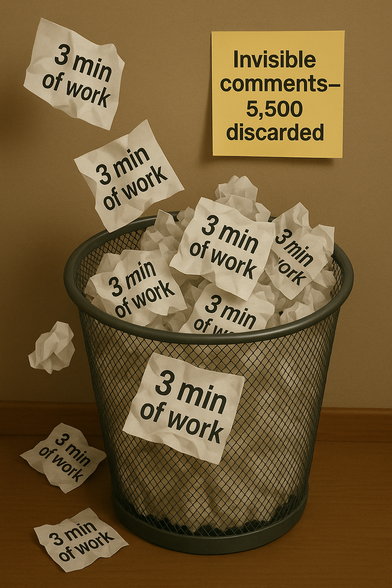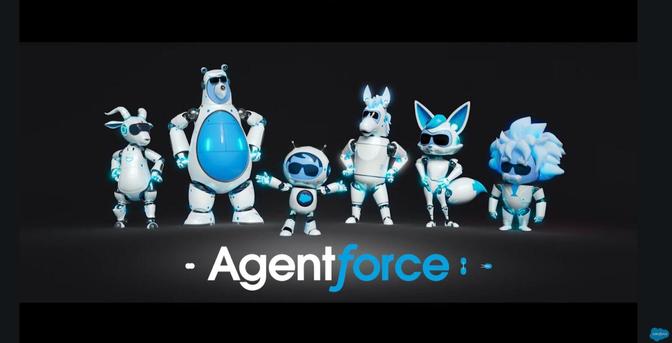Is https://www.handover.ai/ a cool #knowledgemanagement hack (software video interviews you, generates a role-specific handoff kit) or a way to get human workers to offboard to #digitallabor replacements. Does what you know belong to you, or your employer?
#DigitalLabor
We might #tax close to the edge of harm. Watts and water at data centers (favoring harder-to-meter #decentralized #AI). Collect unemployment insurance (and #basicincome contributions) from employers of #digitallabor.
The Gigification of Acting
In this episode of The Internet is Crack, Andy Lauer reflects on streaming’s erosion of residuals and the broader implications for creative labor in the digital age.
🎧 Full episode: https://youtu.be/-luZxxjOafs
#DigitalLabor #StreamingEconomy #TheInternetIsCrack #ActorRights #AndyLauer
Fortnite’s Vader Is Voiced by AI
What happens when legacy voices go synthetic? Are actors being erased?
#VoiceAI #Fortnite #DigitalLabor #EntertainmentIndustry #TheInternetIsCrack
Your Boss Says "Unplug." The Algorithm Disagrees.
#AlwaysOn #DigitalLabor #WorkLifeCrisis #TheInternetIsCrack #24_7Work
📄 What if we viewed digital economies not just as systems, but as labor-atories - sites of active class struggle and experimentation? In his new #wjds paper, Rafael Grohmann (@uoft) explores how digital labor in Latin America reflects this dynamic.
➡️ https://doi.org/10.34669/wi.wjds/5.1.6
#research #socialscience #work #DigitalLabor #DigitalEconomies #PlatformWork #LatinAmerica #GlobalSouth #DigitalSovereignty #AI #DataColonialism #TechGovernance #WorkerOrganizing
@DAIR @towardsfairwork
This isn’t just about fast food. This is a blue-collar BPO revolution.
#DriveThruEconomy #PrestoAutomation #RemoteWork #FastFoodTech #GlobalLabor #OffshoreEverything #PhilippinesSupport #TechInRealLife #Outsourcing2.0 #ModernWorkforce #AIvsHumans #AutomationOrGlobalization #RestaurantTech #MinimumWageHacks #MiddleClassMindset #CostCuttingMoves #BlueCollarBPO #VoiceOps #FutureOfWork #TechMeetsTacos #DominosDriveThru #GlobalTeam #DigitalLabor #RealTimeSupport #FastFoodFuture #WorkFromAnywhere
UNPAID LABOR, ALGORITHMIC DENIAL, AND SYSTEMIC SABOTAGE
May 7, 2025
YouTube built an empire on our free time, our passion, our technical investments—and above all, on a promise: “share what you love, and the audience will follow.” Thousands of independent creators believed it. So did I. For ten years, I invested, produced, commented, hosted, edited, imported, repaired—with discipline, ambition, and stubborn hope, all in the shadows. What I discovered wasn’t opportunity. It was silence. A system of invisible filters, algorithmic contempt, and structural sabotage. An economic machine built on the unpaid, uncredited labor of creators who believed they had a chance. A platform that shows your video to four people, then punishes you for not being “engaging” enough. This four-part investigation details what YouTube has truly cost me—in money, in time, in mental health, and in collective momentum. Every number is cross-checked. Every claim is lived. Every example is documented. This is not a rant. It’s a report from inside the wreckage.
¯
_
INVISIBLE COMMENTS: 33,000 CONTRIBUTIONS THROWN IN THE TRASH
As part of my investigation, I decided to calculate what I’ve lost on YouTube. Not an easy task: if all my videos are shadowbanned, there’s no way to measure the value of that work through view counts. But I realized something else. The comments I leave on channels—whether they perform well or not—receive wildly different levels of visibility. It’s not unusual for one of my comments to get 500 likes and 25 replies within 24 hours. In other words, when I’m allowed to exist, I know how to draw attention.
¯
_
33,000 COMMENTS... FOR WHAT?
In 10 years of using the platform, I’ve posted 33,000 comments. Each one crafted, thoughtful, polished, aimed at grabbing attention. It’s a real creative effort: to spontaneously come up with something insightful to say, every day, for a decade. I’ve contributed to the YouTube community through my likes, my reactions, my input. These comments—modest, yes, but genuine—have helped sustain and grow the platform. If each comment takes roughly 3 minutes to write, that’s 99,000 minutes of my life—60 days spent commenting non-stop. Two entire months. Two months talking into the void.
¯
_
ALGORITHMIC INVISIBILITY
By default, not all comments are shown. The “Top comments” filter displays only a select few. You have to manually click on “Newest first” to see the rest. The way "Top comments" are chosen remains vague, and there’s no indication of whether some comments are deliberately hidden. When you load a page, your own comment always appears first—but only to you. Officially, it’s for “ergonomics.” Unofficially, it gives you the illusion that your opinion matters. I estimate that, on average, one out of six comments is invisible to other users. By comparing visible and hidden replies, a simple estimate emerges: over the course of 12 months, 2 months’ worth of comments go straight to the trash.
¯
_
TWO MONTHS A YEAR WRITING INTO THE VOID
If I’ve spent 60 days commenting over 10 years, that averages out to 6 days per year. Roughly 12 hours of writing every month. So each year, I’m condemned to 1 full day (out of 6) of content invisibilized (while 5 out of 6 remains visible), dumped into a void of discarded contributions. I’m not claiming every comment I write is essential, but the complete lack of notification and the arbitrary nature of this filtering raise both moral and legal concerns. To clarify: if two months of total usage equal 24 hours of actual writing, that’s because I don’t use YouTube continuously. These 24 hours spread across two months mean I spend about 24 minutes per day writing. And if writing time represents just one-fifth of my overall engagement — including watching — that adds up to more than 2.5 hours per day on the platform. Every single day. For ten years. That’s not passive use — it’s sustained, intensive participation. On average, this means that 15 to 20% of my time spent writing comments is dumped into a virtual landfill. In my case, that’s 24 hours of annual activity wiped out. But the proportion is what matters — it scales with your usage. You see the problem.
¯
_
THE BIG PLAYERS RISE, THE REST ARE ERASED
From what I’ve observed, most major YouTubers benefit from a system that automatically boosts superficial comments to the top. The algorithm favors them. It’s always the same pattern: the system benefits a few, at the expense of everyone else.
¯
_
AN IGNORED EDITORIAL VALUE
In print journalism, a 1,500-word exclusive freelance piece is typically valued at around €300. Most YouTube comments are a few lines long—maybe 25 words. Mine often exceed 250 words. That’s ten times the average length, and far more structured. They’re not throwaway reactions, but crafted contributions: thoughtful, contextual, engaging. If we apply the same rate, then 30 such comments ≈ €1,500. It’s a bold comparison—but a fair one, when you account for quality, relevance, and editorial intent. 33,000 comments = €1,650,000 of unpaid contribution to YouTube. YouTube never rewards this kind of engagement. It doesn’t promote channels where you comment frequently. The platform isn’t designed to recognize individuals. It’s designed to extract value—for itself.
¯
#DigitalLabor #InvisibleWork #ContentModeration #PlatformCapitalism #TechCriticism #UserEngagement
Salesforce Launches Agentforce for HR Service to Make Employee Support Easy for Everyone
#Salesforce #Agentforce #AI AIagents #HRTech #EmployeeExperience #HRAutomation #FutureOfWork #DigitalLabor #ServiceCloud #EnterpriseAI
Labor-atories of Digital EconomiesLatin America as a Site of Struggles and Experimentation
Rafael Grohmann
"This article argues that digital labor developments and struggles are laboratories of digital economies, with a special focus on Latin America. This means that, on the one hand, capital is experimenting with and updating forms of control and exploitation through the long trajectory of informality and de-pendency and, on the other hand, workers are trying and experimenting with forms of organizing and collectivities, also updating Latin America’s rich histories of organizing, solidarity economies, and community technologies. The emphasis on “labor” implies that these laboratories are products of class struggles and capital – labor relationships. The paper unpacks the argument with four short insights from ongoing research, addressing 1) Latin America as more than a research site, 2) the updating of informality in the Latin American artificial intelligence context, 3) the global implications of data work, artifi-cial intelligence value chains, and the cultural sector, and 4) digital solidarity economies as a Latin American response to the current digital labor scenario, including digital sovereignty and autonomy."
https://ojs.weizenbaum-institut.de/index.php/wjds/article/view/5_1_6/5_1_6
#LatinAmerica #DigitalEconomy #DigitalLabor #AI #Informality #Digital Sovereignty
Imagine I posted so many WhatsApp statuses, but not even 1 USD from Meta could pay me.
Every piece of my content is mined, and they said Facebook and WhatsApp are not boring, while those social media users, I am one of them.
This is unfair. I'm sad.
#PayContentCreators #MetaExploitation #DigitalLabor #WhatsAppStolenValue #DataMining #UnpaidWork #DeleteMeta #FediPact #SocialMedia #ModernSlavery
Etudiants en situation de précarité ? Vendez-nous vos données. De la biométrie et des cabinets vautours qui tournent autour.
"Le procédé de double dégueulasserie qui vise à traquer biométriquement les populations déjà les plus précaires est largement documenté"
"Tandis que les géants de la tech promettent l'avènement d'une nouvelle humanité, la réalité de leur production reste totalement occultée. Pendant que les data centers bétonnent les paysages et assèchent les rivières, des millions de travailleurs à travers le monde préparent les milliards de données qui alimenteront les algorithmes voraces des Big Tech, au prix de leur santé mentale et émotionnelle..." #IA #travailleursduclic #digitallabor
https://www.france.tv/documentaires/documentaires-societe/6888928-les-sacrifies-de-l-ia.html
How are companies using algorithm-based management and performance tracking, and how do workers perceive them? What are the challenges for works councils and trade unions?
Read this paper via Weizenbaum Journal of the Digital Society #wjds by P Wotschack, L Hellbach, F Butollo:
➡️ https://doi.org/10.34669/wi.wjds/4.3.5
#research #socialscience #work ##LaborRights #AI #AlgorithmicManagement #GigEconomy #DigitalLabor #FutureOfWork #PlatformEconomy @WZB_Berlin @towardsfairwork @tuberlin @FOKUSpublic
I'm excited to join the @indl global community in Santiago, Chile, for #INDL7 in a few days. Can't join us in vibrant Santiago? You can still be part of the experience by watching the livestreaming of keynotes and plenary sessions. https://diplab.eu/are-you-ready-for-the-indl-7-conference-a-milestone-in-digital-labor-research/ #digitallabor #futureofwork #work #labor #chile #santiago
Today, AI is still powered by millions of data workers, both men and women. In Victorian England, many of the same data tasks were performed by "lady computers". Though they were recruited at Cambridge colleges, they got paid as little as £4 per month. Same old story.
#womenintech #historiofai #datawork #digitallabor #steampunk #retrofuturism #historyofcomputing
How does algorithmic management influence working conditions? And can the concept of "algorithm governance" help us better understand how #labor platforms govern #work?
Read this new paper by Valeria Pulignano (KU Leuven):
➡ https://doi.org/10.34669/WI.WJDS/4.3.6
via Weizenbaum Journal of the Digital Society #wjds #openaccess #AlgorithmManagement #AlgorithmGovernance #PlatformWork #DigitalLabor #GigEconomy #WorkConditions #LaborMarket #EmploymentForms #LaborRegulation #research #sociology #socialscience
Yo folks, wanna work with us on a #DiPLab project? It’s headed by @ptubaro, and is called VOLI. We're hiring a postdoc to study data work on microtasking platforms, using quali/quanti methods.
https://emploi.cnrs.fr/Offres/CDD/UMR9194-PAOTUB-002/Default.aspx?lang=EN
NB: Fluency in 🇬🇧 + either 🇧🇷 or 🇩🇪 is a must. 🇫🇷 & 🇪🇸 optional.
Please🔄
#job #postdoc #paris #cnrs #sociology #digitallabor #artificialintelligence #academia #datawork #microwork #cnrs
🧑🏽🎓 🙋🙋🏿♀️🧑🏾🎓#DiPLab PhD students are doing great research! @noisheek explores disinformation and digital dispossession of Indian workers, while Diego Rivera looks at microwork in Chile. Attend their talks live at our monthly webinar on Wed., June 12, 2PM CEST. Register here👉 https://diplab.eu/diego-rivera-and-aishik-saha-are-guest-speakers-at-our-diplab-seminar-wed-12-june-2024-200-pm-cet/ #india #disinformation #chile #ai #data #digitallabor #crowdwork
🚨Extended deadline! 🗓️
Want to travel to Santiago, Chile and join a vibrant community of digital labor scholars? Send us your abstract for #INDL7 "Digital Labor and Power Dynamics" by June 9, 2024. Don't miss out! 🌍📚 Submit now👇 https://www.indl.network/indl-7/ #digitallabor #platformeconomy #ia #gigwork #globalization #data #algorithmicmanagement #latam #chile #conference


